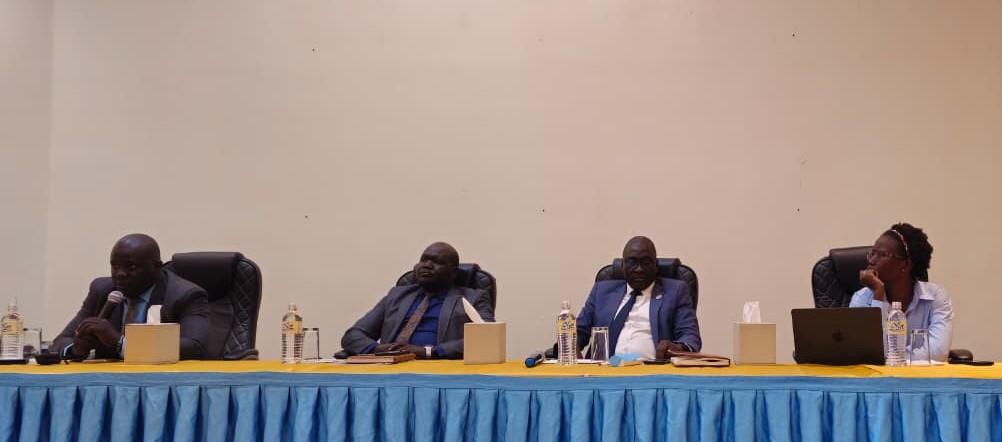The National Security Service (NSS) on Wednesday pushed back at a new report by the South Sudan Human Rights Defenders Network (SSHRDN) that documents hundreds of civic-space violations, saying the agency does not carry out a systematic campaign of repression and challenged the report’s authors to produce case-by-case evidence.
The 40-page SSHRDN report titled “This Town Will Be Too Small for You: Repression of Civic Space in South Sudan” is based on three years of monitoring (June 2022–June 2025). It documents civic space violations, highlights patterns of abuse, and pushes for reforms that will protect journalists, civil society, and human rights defenders while aligning national laws with constitutional guarantees.
At the report’s public launch, presented by Advocate Omara Joseph, concerns were raised about the scale and severity of the incidents documented, and about the absence of meaningful remedies for victims.
The report verified 114 incidents from summonses and arbitrary detentions to closures of media outlets and disruptions of public events and identified patterns implicating security services, including the NSS, joint operations, and police.
The Deputy Chairperson of the South Sudan Human Rights Commission, Zekia Ibsen, told the forum that many civil society actors and journalists live in fear of reprisals when they leave the safety of such meetings.
NSS demands evidence
David John Kumuri, the Spokesperson for the National Security Service (NSS), denied the report’s central claim that the service is principally responsible for the violations. He called on the Network and others to present detailed proof.
“It is not within the policy of the National Security Service to violate, unless individuals who abuse their powers might have done that,” he stated. “You need to provide also the proof in case number one, this is a violation, number two, this is a violation without fear or favor.”
Kumuri said the NSS’s core mandate is to “protect the national interests of the Republic of South Sudan,” and that intelligence and certain investigative functions, which he said are sometimes mistaken for policing, fall under that remit.
He also told reporters the NSS has mechanisms to hold officers to account, including a non-summary tribunal established by presidential directive.
“We have tried almost 18 or 19 cases,” Kumuri said, urging journalists and civil society to make use of the tribunal and to engage constructively with security institutions.
SSHRDN officials at the launch said the report is grounded in verified evidence collected by a network of trained monitors and corroborated through documents and witness testimony.
The Network declined attempts to discredit the findings as anecdotal and reiterated a set of recommendations aimed at curbing abuses, improving oversight, and reforming laws that criminalize dissent.
Key recommendations include repealing criminal defamation, strengthening parliamentary and judicial oversight of security organs, establishing victim and witness protection mechanisms, and creating clear complaint and redress procedures for arbitrary arrests and censorship.
The SSHRDN extract presented at the launch highlighted 114 verified civic-space violations, out of 164 incidents logged during monitoring, arrests, and detentions concentrated in Juba, Rumbek, Bor, and Wau, 11 documented disruptions of public gatherings and protests, eight closures of NGOs or media outlets, as well as 15 incidents in which journalists were summoned by authorities.
The report notes that many of the abuses are carried out by actors who operate with impunity and that existing laws, including provisions in the National Security Service Act and sections of the Penal Code, enable broad powers of detention and censorship that contradict constitutional guarantees.
During the launch, several participants pressed the NSS for more than denials. Zekia Ibsen and other civil society leaders asked what concrete steps the Service is taking to discipline individual officers accused of abuses and to make detention facilities accessible to oversight bodies.
Kumuri responded that the NSS is willing to receive complaints and that its internal mechanism and the presidential tribunal are available, but he reiterated his demand that complainants present “clear” evidence for each alleged violation.
Human rights groups say such processes are necessary but insufficient. They argue that systemic reforms — clearer separation of intelligence and policing functions, civilian oversight, and legislative changes — are needed to restore public confidence.
The national security law gives excessive powers to security forces, among others, arrest without a warrant, search suspected criminals and places, and seize property connected with crimes or offences against the state.




